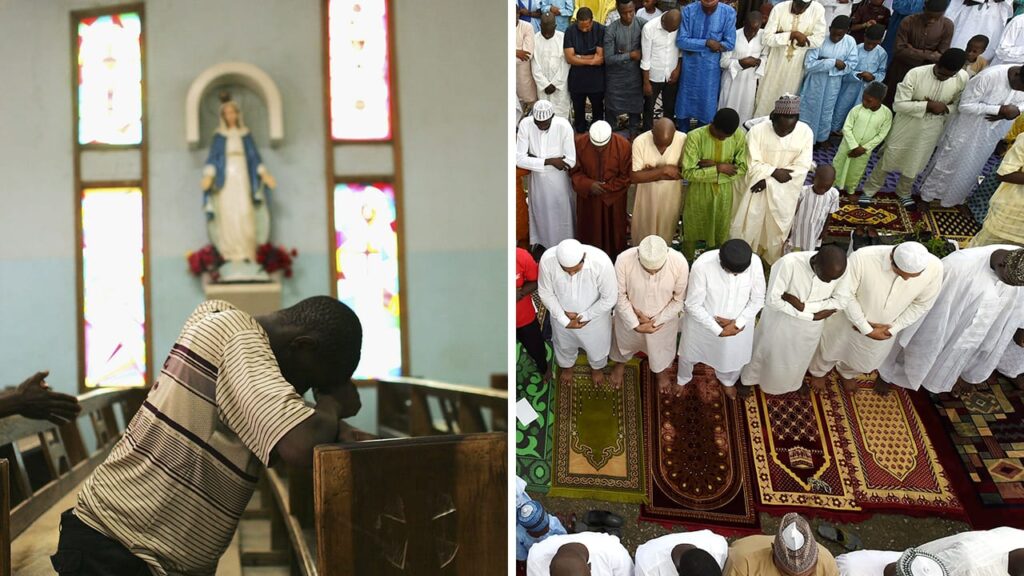In Summary
- The African countries with the highest number of religious people are also among the rankings of the most populous and politically active. Population and strong belief in religion often shape civic engagement.
- Religious institutions often act as a body of parallel systems. In cases of absent governance, they often step in to manage schools, humanitarian aid, and hospitals making them central to resilience and community survival.
- In countries like Tanzania, Uganda, and Kenya, religion is more saturated at the youth level. Youth revivals, large-scale gatherings, and digital evangelism shape their daily values and routines.
Deep Dive!!
Religion in Africa isn’t just about faith or obligation. It’s deeply tied to the daily lives of the people shaping education systems, influencing politics, supporting national development plans, and even family decisions. Almost the entire population in a country identifies with one religion or the other due to the thin line between tradition and religion.
In many regions, religion holds more power than the government. It draws the largest crowds, helps in infrastructure, education, and even influences the mental well-being of the people. Using the most recent data from World Population Review, the ranking reflects deep-rooted identity and not just nominal belief.
10. Algeria

Algeria records a religious population of 39.5 million. Algerians practice Sunni Islam deeply rooted in their cultural and national identity. Even with a secular constitution, religion still plays a significant role in the daily and public life of the people. Mosques are not only worship spaces but also a place of learning and local governance. The state maintains religious affairs, yet during Ramadan and Friday prayers, personal devotion remains high.
9. Sudan
Sudan records a religious population of 41.9 million with Islam largely dominating Christianity and traditional belief. Sudan has experienced a lot of religious tensions, especially after the South Sudan secession, but despite this, religion still persists as a mainspring in the society. In rural areas where government services are limited, faith communities often serve as a support system to the people.
8. Uganda
With 45.5 million records, religion in Uganda goes beyond worship, it influences education, governance, and family life. The religious population is mostly dominated by Christians (both Anglican and Catholic) and Muslims. In rural areas, the religious institutions often act as key players offering school, local leadership, and healthcare. In recent years, the youth are also more involved in religious activities like Evangelical movements.
7. South Africa
South Africa’s 45.7 million religious population is diversified mirroring its multicultural society. They include Christians, Muslims, Hindus, and traditional African religion followers. Notably during apartheid, Churches have played a historic role in political resistance. Today, they still remain central to social justice campaigns, youth programs, and community organizing.
6. Kenya
Kenya has a 51.4 million religious population. Christianity dominates, with Islam prevalent along the coast and northeast. The churches, mosques, and temples often provide amenities for schools, community centers, and clinics. Religion also affects the political system with candidates often aligning themselves with religious groups or leaders for political support.
5. Tanzania
Tanzania’s 60.4 million religious population is mainly dominated by Christians and Muslims. Traditional worshipers are also present in some rural areas. In Tanzania, faith plays a key role in both public and private life. The peaceful coexistence of religions is often seen as a model to other countries with interfaith conversations common and respected. Religion also helps in major development with the aid of religious radio stations and faith-based NGOs.
4. Democratic Republic of Congo
DRC is largely dominated by Christians, especially Pentecostals and Roman Catholics. It records a religious population of 83.6 million. In a country with political instability, the church often serves as a more trusted institution, running hospitals, conflict mediation centers, and schools. Religion is also embedded in cultures with crusades, faith-based music, and revivals being the new norm.
3. Egypt
Egypt is mainly known for its ancient pyramids, but it is also identified as one of Africa’s most religious countries. With a 94.9 million record, it’s largely dominated by Islam. The historic Al-Azhar University, one of Islam’s most respected institutions, centers Egypt as a religious discourse for Muslims. Although a minority, the Coptic Christian community is still deeply influential in the country’s history.
2. Ethiopia
Ethiopia is one of the oldest Christian-dominated countries in the world and it records a religious population of 101 million. The Ethiopian Orthodox Church can be traced to the 4th century and still holds significant influence today. In the eastern region, Islam is also widely practiced. Religious festivals like Timket and Maskel are major national holidays attracting millions. Religious customs influence politics, dietary practices, and even clothing.
1. Nigeria
With a 203.9 million religious population, Nigeria is the most populous country in Africa and this can be largely attributed to its population size. Christianity is dominant in the South and Islam in the North. Churches and Mosques are available in almost every community. In Nigeria, Religion influences nearly every aspect of life, like politics, education, culture, and even music. Religious institutions control some of the schools, hospitals, and media outlets in the country.
https://www.africanexponent.com/top-10-african-countries-with-the-highest-number-of-religious-people/


